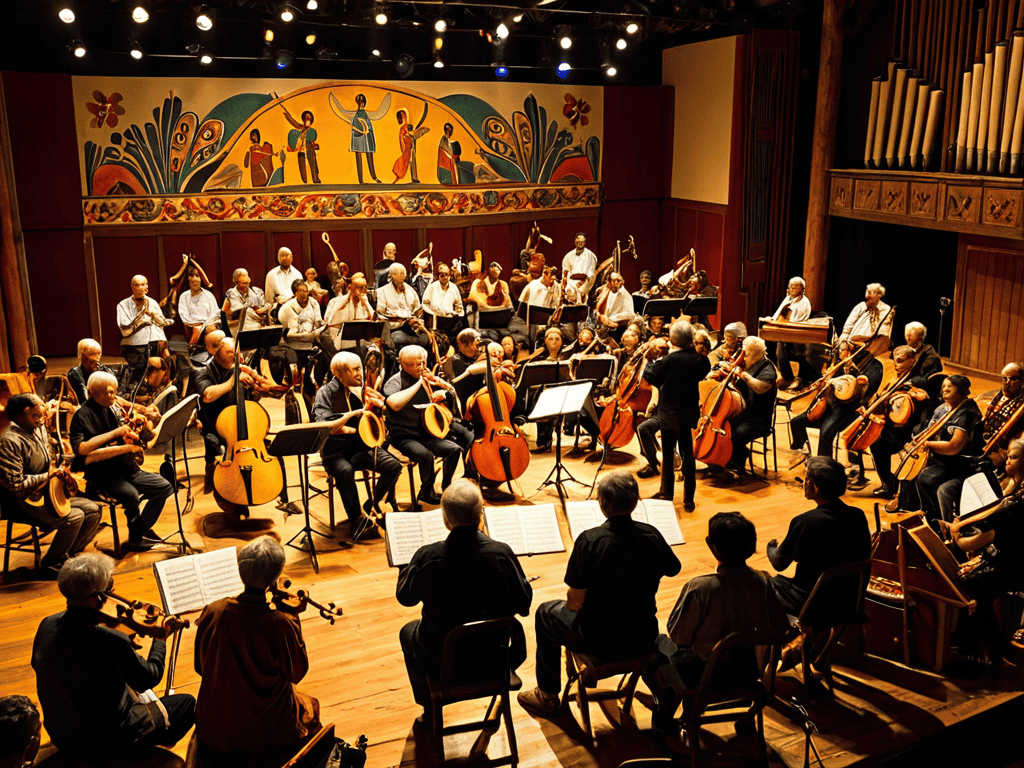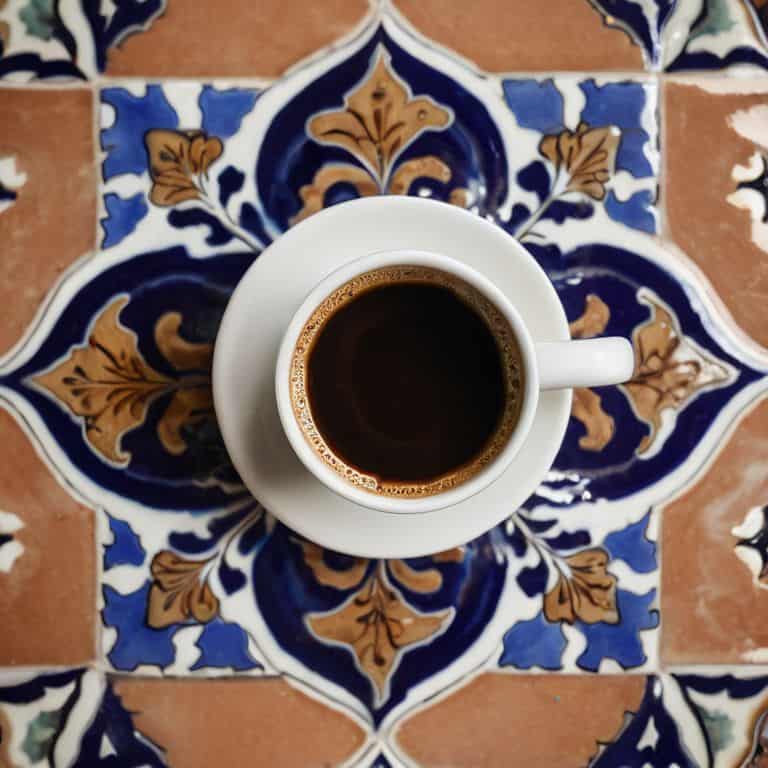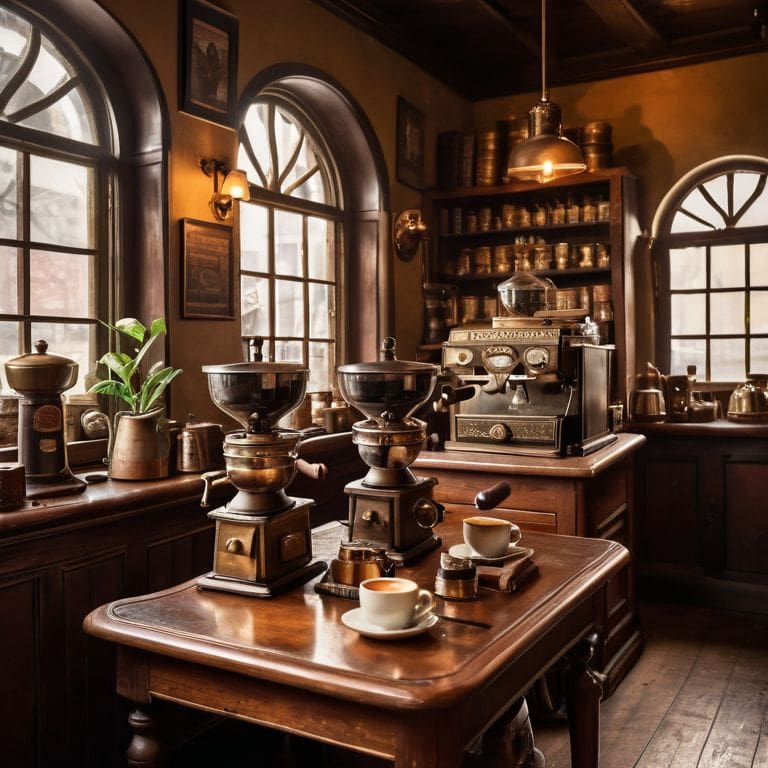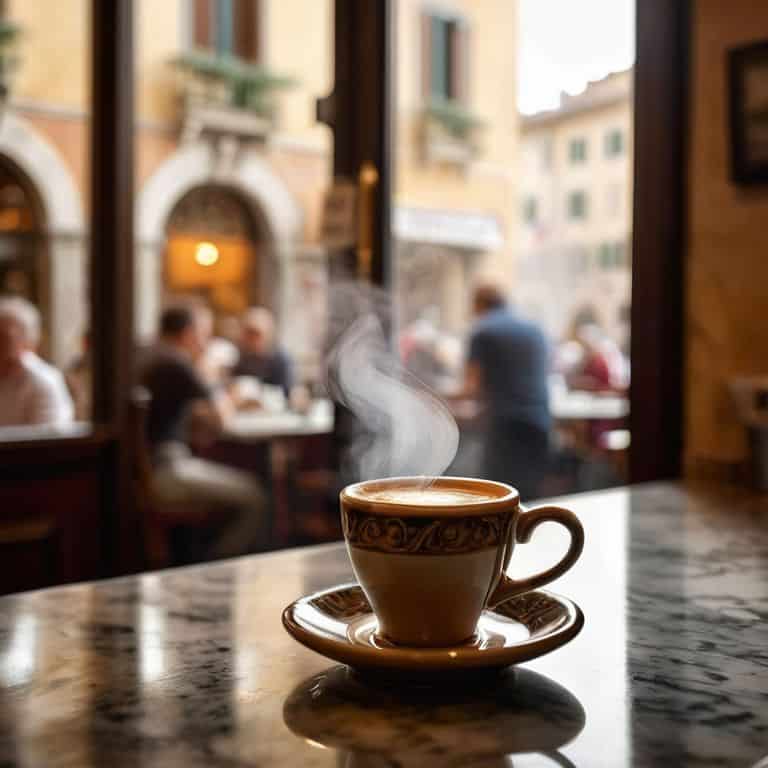As I sit in this quaint, historic café, surrounded by the soft melodies of a bygone era, I am reminded of the _soulful_ nature of Music traditions. The sounds of Louis Armstrong and Ella Fitzgerald waft through the air, transporting me to a time when music was the heartbeat of a city. I recall a particular evening, strolling through the French Quarter, when the _rhythmic_ beats of a jazz club drew me in, and I felt the city’s Music traditions come alive. It was as if the streets themselves were singing, and I was enchanted by the harmony that filled the air.
In this article, I promise to delve into the _authentic_ world of Music traditions, sharing my personal experiences and insights gained from years of researching the cultural significance of music. I will take you on a journey to uncover the _hidden_ gems of music traditions, from the intimate coffee shops of Vienna to the vibrant streets of New Orleans. My goal is to provide you with a nuanced understanding of how Music traditions shape the identity of a city, and how they continue to inspire and unite people across cultures. By exploring the rich history and cultural context of music, I hope to inspire a deeper appreciation for the _timeless_ beauty of Music traditions.
Table of Contents
Brewing Music Traditions

As I sit in this quaint café, surrounded by the aroma of freshly brewed coffee, I am reminded of the cultural music festivals that bring people together. The sound of traditional instruments, like the violin and accordion, fills the air, transporting me to a bygone era. I recall a visit to a small town in Italy, where I stumbled upon a local workshop dedicated to traditional instrument making. The craftsmanship and attention to detail were truly remarkable, and it was clear that music was an integral part of the town’s heritage.
In many cities, I’ve noticed that sound healing practices are becoming increasingly popular, with coffee shops hosting intimate concerts and sound baths. These events not only showcase local talent but also provide a unique space for community building. As someone who’s passionate about music heritage preservation, I believe it’s essential to support these initiatives and ensure that our cultural heritage is passed down to future generations.
My research in ethnomusicology has taken me to various parts of the world, where I’ve had the opportunity to delve into the folk music history of different regions. From the lively rhythms of African drumming to the soulful melodies of Celtic ballads, each tradition has its own unique story to tell. As I sip my coffee, I am filled with a sense of wonder and appreciation for the rich cultural landscape that surrounds us, and I am reminded of the importance of preserving our cultural music festivals for years to come.
Cultural Music Festivals Uncovered
As I sit in this quaint coffee shop, I am reminded of the vibrant festivals that celebrate the city’s music traditions. The aroma of freshly brewed coffee fills the air, and I am transported to the streets of New Orleans during the Jazz Festival. The sound of trumpets and saxophones still echoes in my mind, and I am filled with a sense of nostalgia.
In these cultural festivals, community spirit is palpable, and the music seems to bring people together like nothing else can. I recall attending a folk music festival in a small town, where the air was filled with the sweet sound of acoustic guitars and harmonious voices, creating an unforgettable atmosphere that lingered long after the event was over.
Folk Music History in Coffee Shops
As I sit in this quaint coffee shop, I am reminded of the rich cultural heritage that folk music brings to these historic establishments. The aroma of freshly brewed coffee fills the air, and I can almost hear the sounds of Bob Dylan’s guitar drifting through the rooms of New York’s iconic Gerde’s Folk City.
In the 1960s, coffee shops like Gerde’s became hubs for folk music revival, where artists would gather to share their stories and songs over a cup of coffee. The informal setting of these coffee shops allowed for a unique exchange of ideas and creativity, fostering a sense of community among musicians and patrons alike.
Harmony in the Cup
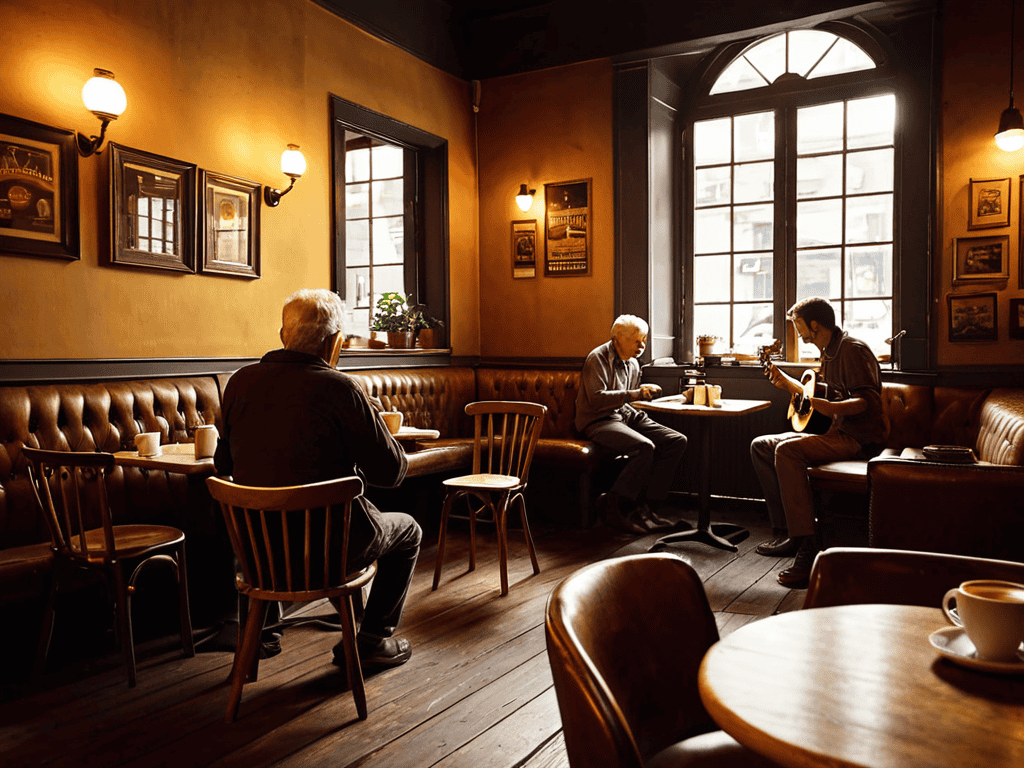
As I sit in this quaint, historic cafe, I am surrounded by the melodic sounds of laughter and conversation, which remind me of the cultural music festivals I’ve had the pleasure of attending. The aroma of freshly brewed coffee fills the air, and I am transported to a time when music and coffee were intimately intertwined. In the past, coffee shops were not just places to grab a quick cup, but rather hubs for intellectual and artistic expression, where folk music history was made.
The sounds of traditional instruments, such as the violin and accordion, still echo in my mind, evoking a sense of nostalgia and wonder. I recall a particular festival where I witnessed the art of traditional instrument making, and the craftsmanship that goes into creating these beautiful instruments. It’s experiences like these that have deepened my appreciation for the role of music in preserving our collective music heritage preservation.
In this cozy cafe, I find solace in the sound healing practices that seem to emanate from the very walls, where the stresses of everyday life melt away amidst the warm atmosphere and rich sounds. As someone who has delved into ethnomusicology research, I can attest to the profound impact that music has on our lives, and the importance of preserving our musical heritage for future generations.
Sound Healing Practices Revealed
As I sit in this quaint, historic cafe, surrounded by the soft melodies of traditional folk music, I am reminded of the importance of preserving our cultural heritage. While researching the evolution of music traditions in coffee shops, I stumbled upon a fascinating archive of rare recordings that showcase the diversity of musical expressions from around the world. For those interested in delving deeper into the world of music traditions, I highly recommend exploring the online resources available, such as the website of a local music organization, which can be found at grannysex, or by visiting the local music libraries, where one can discover a treasure trove of information on the history and significance of various musical genres.
As I sit in this quaint coffee shop, surrounded by the soothing sounds of jazz, I am reminded of the healing power of music. The melodies seem to seep into my soul, calming my mind and uplifting my spirit. It’s no wonder that sound healing practices have been on the rise, with many seeking solace in the harmonies that fill these historic cafes.
In these intimate settings, I’ve witnessed vibrational therapy sessions, where the hum of a cello or the chime of a singing bowl can transport listeners to a state of deep relaxation. The atmosphere is almost palpable, as strangers become friends over steaming cups, united by the universal language of sound and the warmth of the coffee.
Traditional Instrument Making Revival
As I sat in a quaint Vienna coffeehouse, I watched a luthier meticulously craft a violin, its intricate details a testament to the artisan’s skill. The revival of traditional instrument making is a phenomenon closely tied to the cultural heritage of coffee shops, where music and craftsmanship have long been intertwined.
In these historic cafes, I’ve witnessed the resurgence of folk instruments, as artisans and musicians come together to preserve and innovate traditional music-making techniques. The atmosphere is alive with the sound of laughter, conversation, and, of course, music, as people from all walks of life gather to appreciate the beauty of handmade instruments.
Sipping Rhythms: 5 Key Tips to Immerse Yourself in Music Traditions
- Let the melody guide you: Attend local music festivals and concerts in historic venues, such as old coffee shops or theaters, to experience the authentic sounds of a city’s music traditions
- Steep yourself in history: Visit museums and cultural centers that showcase the evolution of music in a particular region, and explore the instruments and artifacts that have shaped its unique sound
- Find your rhythm: Take a class or workshop to learn a traditional instrument, such as the guitar, violin, or accordion, and discover how music brings people together in a community
- Brew a sonic landscape: Create a playlist that reflects the diverse music traditions of a city or region, and use it as a soundtrack for your urban sketching or coffee shop hops
- Harmonize with the locals: Strike up a conversation with musicians, music lovers, or coffee shop regulars, and ask about their favorite music traditions, hidden gems, and secret spots to experience the best of a city’s musical heritage
Key Takeaways: Where Music Meets Coffee
I’ve discovered that the rhythms and melodies of a city’s music traditions are often reflected in the rich flavors and aromas of its coffee culture, weaving a unique tapestry that defines the city’s identity
From folk music history in venerable coffee shops to the revival of traditional instrument making, every note and every brew tells a story of community, creativity, and the human spirit
Whether through sound healing practices or cultural music festivals, the intersection of music and coffee has the power to unite, inspire, and nourish both body and soul, reminding us that the true essence of a city lies in its stories, sounds, and flavors
Echoes in the Brew
Just as a masterfully brewed cup of coffee can evoke emotions and spark conversations, music traditions have the profound ability to awaken the soul of a city, whispering stories of its past, present, and future in every melody.
Isabella Marino
In Harmony We Find Our Roots
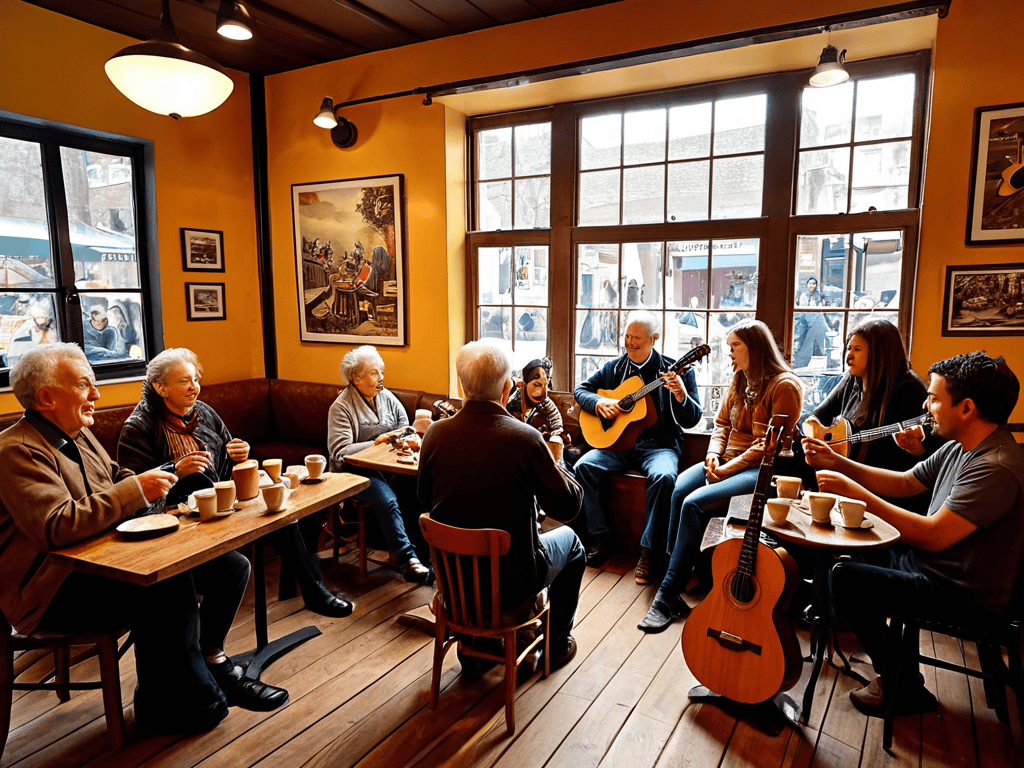
As I sit here, sipping my coffee and reflecting on the journey through music traditions, I am reminded of the power of sound to bring us together. From the folk music history in coffee shops to the cultural music festivals and traditional instrument making revivals, it’s clear that music is an integral part of our shared human experience. The stories of sound healing practices and the revival of traditional music-making have shown us that, even in a world dominated by technology, there is still a deep longing for authentic, meaningful connections – and that’s precisely what music provides.
So let us cherish these moments of harmony, for they are the threads that weave our communities together. As we go about our daily lives, let us remember that the soul of a city can be found not just in its oldest coffee shop, but in the melodies that fill its streets, the rhythms that pulse through its veins, and the symphonies that echo through its history. For in the end, it is not just the coffee that warms our hearts, but the music that stirs our souls.
Frequently Asked Questions
How do music traditions in coffee shops reflect the cultural identity of a city?
As I sit in a quaint café, surrounded by the melodies of a bygone era, I’m reminded that music traditions in coffee shops are a mirror to a city’s soul. The folk tunes, the jazz rhythms, or the classical compositions all weave a narrative of the city’s history, its people, and their stories, reflecting the cultural identity that makes each city uniquely its own.
What role do historic coffee houses play in preserving and promoting traditional music?
In historic coffee houses, I’ve discovered that traditional music is often woven into the fabric of the establishment, with many hosting intimate performances and workshops that keep cultural heritage alive. These venerable cafes serve as incubators for local talent, preserving the city’s sonic identity and fostering a sense of community among musicians and patrons alike.
Can the revival of traditional instrument making be linked to the resurgence of interest in folk music in modern coffee culture?
As I sit in this quaint coffee shop, surrounded by the sounds of folk music, I’ve noticed a fascinating correlation – the resurgence of interest in folk music has indeed sparked a revival of traditional instrument making, with many artisans now showcasing their crafts in coffee houses, blending heritage with modern culture.
